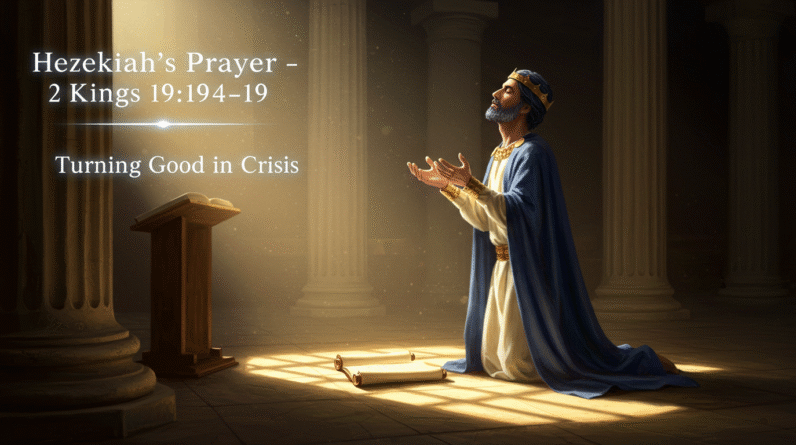In “Prayer And Fasting According To The Bible,” you will discover the profound significance of prayer and fasting as outlined in the Bible. This enlightening article explores the spiritual practices of prayer and fasting, delving into their purpose, benefits, and how they can deepen your connection with a higher power. By understanding the biblical principles behind prayer and fasting, you will gain valuable insights on how to incorporate these practices into your own life, allowing for a deeper spiritual journey and a closer relationship with God.
Definition of Prayer
Prayer is the act of communicating with God. It is a form of worship and a way for believers to connect with the divine. Through prayer, individuals express their thoughts, emotions, needs, and desires to God, seeking guidance, comfort, and strength. Prayer is a fundamental aspect of many religious traditions, including Christianity, and plays a vital role in personal faith journeys and spiritual growth.
Prayer as Communication with God
At its core, prayer is a means of communication between the individual and God. It is a way to establish a personal relationship with the divine, sharing one’s joys, concerns, hopes, and fears with God. Through prayer, individuals can express their gratitude for blessings received, seek forgiveness for their shortcomings, and present their requests for guidance, healing, or provision. It is a channel for believers to connect with the divine and experience a sense of peace, comfort, and solace.
The Importance of Prayer in the Bible
Prayer holds significant importance in the Bible, as it is frequently mentioned and demonstrated by various biblical figures. In the scriptures, prayer is portrayed as a way to seek God’s will, find strength in times of adversity, and experience His presence in daily life. It is highlighted as a powerful tool through which believers can receive answers, experience miracles, and witness the transforming work of God in their lives. The Bible emphasizes the necessity of prayer in believers’ spiritual journeys and encourages them to pray consistently and earnestly.
Different Forms of Prayer
Prayer can take various forms, reflecting the diversity of human experiences and the multifaceted nature of communication with God. Some common forms of prayer include:
- Adoration: Offering praise and adoration to God for His attributes, character, and works.
- Confession: Acknowledging and repenting of one’s sins, seeking God’s forgiveness and cleansing.
- Thanksgiving: Expressing gratitude to God for His blessings, provisions, and answered prayers.
- Supplication: Presenting specific requests or petitions before God, seeking His intervention and guidance.
- Intercession: Praying on behalf of others, asking for God’s blessings, healing, and intervention in their lives.
- Meditation: Reflecting on God’s Word, contemplating His truths, and seeking spiritual insight and understanding.
Each form of prayer serves a unique purpose and can be practiced individually or in communal settings, such as in worship services or prayer groups.
Definition of Fasting
Fasting is a spiritual discipline that involves abstaining from food, drinks, or other pleasures for a specific period of time. It is commonly practiced in various religious traditions, including Christianity, as a means of self-denial and seeking spiritual purification. Fasting is not merely an act of physical deprivation but is deeply rooted in the desire to draw close to God, cultivate spiritual discipline, and find clarity and direction in life.
Fasting as a Spiritual Discipline
As a spiritual discipline, fasting involves willingly abstaining from food or certain pleasures for a designated period. It requires self-control, discipline, and a focus on cultivating one’s spirituality. By denying oneself physical nourishment, individuals open themselves up to deeper reflection, self-examination, and prayer. Fasting serves as a reminder of our dependence on God for sustenance and highlights the spiritual hunger that can only be satisfied by a relationship with Him.
Fasting in the Bible
Fasting is mentioned throughout the Bible, with numerous examples of individuals and communities fasting for various reasons. In the Old Testament, fasting was often associated with mourning, repentance, and seeking God’s favor. It was a way for individuals to humble themselves before God and demonstrate their desire for His guidance and intervention. In the New Testament, Jesus taught about fasting as a means of seeking God’s will and drawing closer to Him.
Different Types of Fasting
Fasting can take different forms, depending on the purpose and individual preferences. Some common types of fasting include:
- Water-only fast: Abstaining from all food and drinks except for water.
- Partial fast: Restricting certain types of food while still maintaining a basic intake for sustenance.
- Intermittent fast: Engaging in cycles of fasting and eating within specific timeframes.
- Juice fast: Consuming only fruit or vegetable juices while abstaining from solid food.
- Daniel fast: Following a vegetarian or plant-based diet based on the example of Daniel in the Bible.
Each type of fast has its own guidelines and can be chosen based on personal preferences and health considerations.
This image is property of images.unsplash.com.
Prayer and Fasting in the Old Testament
Examples of Prayer and Fasting in the Old Testament
In the Old Testament, prayer and fasting were often intertwined as spiritual practices. Many prominent figures engaged in prayer and fasting during significant moments in their lives. For example, Moses fasted for forty days and nights while seeking God’s guidance on Mount Sinai. The prophet Samuel called for a nationwide fast during a time of crisis, seeking God’s intervention for the nation of Israel. The people of Nineveh, as depicted in the book of Jonah, fasted and prayed as a collective response to God’s impending judgment.
The Purpose of Prayer and Fasting in the Old Testament
In the Old Testament, prayer and fasting served several purposes. They were expressions of repentance, seeking God’s forgiveness and mercy in times of disobedience or national crisis. Prayer and fasting were also used as a means of seeking God’s guidance, discerning His will, and receiving His favor in times of need. Additionally, prayer and fasting were acts of worship and devotion, demonstrating one’s faith, commitment, and reliance on God alone.
Prayer and Fasting in the New Testament
Examples of Prayer and Fasting in the New Testament
The New Testament also provides examples of prayer and fasting as spiritual practices. Jesus, the central figure of Christianity, regularly engaged in prayer and fasting. Before beginning His public ministry, Jesus spent forty days and nights fasting in the wilderness, seeking spiritual strength and victory over temptation. He taught His disciples about the importance of private prayer and fasting, encouraging them to do so with sincerity and humility.
The Purpose of Prayer and Fasting in the New Testament
In the New Testament, prayer and fasting served similar purposes as in the Old Testament. They were acts of devotion, surrender, and seeking God’s will. Prayer and fasting were seen as means of deepening one’s spiritual connection with God, finding strength in times of adversity, and growing in faith. These practices were not mere religious rituals but were actions that revealed a genuine desire to draw closer to God, align one’s heart with His purposes, and experience His transformative power.
This image is property of images.unsplash.com.
Benefits of Prayer and Fasting
Spiritual Renewal and Growth
Prayer and fasting can lead to spiritual renewal and growth. By intentionally setting aside time for prayer and fasting, individuals create space for self-reflection, introspection, and listening to God’s voice. This deliberate focus on spiritual matters allows believers to reorient their priorities, realign their hearts with God’s desires, and experience personal transformation. Through prayer and fasting, individuals can break free from spiritual stagnation, find renewed passion and enthusiasm for their faith, and deepen their relationship with God.
Drawing Closer to God
Prayer and fasting provide opportunities for believers to draw closer to God. By removing distractions, such as food or other pleasures, individuals can concentrate their attention and energy on seeking God’s presence and listening to His voice. This intentional seeking of God’s presence fosters intimacy and deepens the relationship between the believer and the divine. The act of prayer and fasting becomes a journey of getting to know God more intimately, experiencing His love and grace in a profound way.
Seeking Guidance and Wisdom
Prayer and fasting are often employed as a means of seeking guidance and wisdom from God. In times of decision-making or uncertainty, believers turn to God in prayer, asking for His direction and discernment. By combining prayer with fasting, individuals demonstrate their reliance on God’s wisdom and desire to align their will with His. The practice of prayer and fasting positions believers to hear God’s voice and be receptive to His leading, enabling them to make decisions that are in accordance with His plans and purposes.
The Relationship Between Prayer and Fasting
Prayer as a Companion to Fasting
Prayer and fasting are closely intertwined, with prayer serving as a companion to fasting. While fasting involves the physical act of abstaining from food or other pleasures, prayer is the spiritual practice that accompanies and complements fasting. Through prayer, individuals communicate with God, pour out their hearts, seek His presence, and seek His guidance. Prayer sustains and strengthens the individual during the period of fasting, providing spiritual nourishment and connection with the divine.
Fasting as a Spiritual Catalyst for Prayer
Fasting can serve as a catalyst for prayer, intensifying the believer’s focus on seeking God’s will and presence. By willingly denying oneself physical nourishment, individuals create an increased space for spiritual receptivity and sensitivity. Fasting serves as a reminder of one’s dependency on God, humbling the individual and fostering a posture of surrender and openness. This heightened spiritual state becomes a catalyst for deep and heartfelt prayer, igniting a fervent desire to commune with God and experience His transformative power.
This image is property of images.unsplash.com.
How to Pray and Fast According to the Bible
Preparing for Prayer and Fasting
Before embarking on a period of prayer and fasting, it is essential to prepare both physically and spiritually. Physically, it may be wise to consult with a healthcare professional, especially if there are any underlying health conditions. Spiritually, it is important to approach prayer and fasting with the right motives and attitudes, seeking God’s guidance, and desiring to draw closer to Him.
Choosing the Right Time and Duration
Prayer and fasting can be practiced individually or in groups, and the duration can vary based on personal circumstances and preferences. It is crucial to choose a time and duration that allows for focused prayer and reflection without undue strain on the body. It may be helpful to start with shorter periods and gradually increase the duration as one becomes more comfortable. The individual should also consider any prior commitments, responsibilities, or health considerations that may impact the chosen time and duration.
Setting Spiritual Goals
Setting spiritual goals can enhance the prayer and fasting experience. By identifying specific areas of growth or areas of concern, individuals can direct their prayers and fasting towards those specific goals. This helps in maintaining focus and intentionality throughout the period of prayer and fasting. Examples of spiritual goals may include seeking greater patience, discerning God’s will in a particular situation, or overcoming personal struggles.
Methods of Prayer and Fasting
There are various methods of prayer and fasting that individuals can engage in, based on personal preferences and spiritual needs. Some common methods include:
- Consecutive fasting: Abstaining from food and drinks for a specific period, such as one day or several days in a row.
- Alternate-day fasting: Fasting on alternate days while consuming a normal diet on non-fasting days.
- Meal skipping: Skipping one or more meals during the day to create space for prayer and reflection.
- Partial fast: Restricting certain types of food or meals while still maintaining a basic intake for sustenance.
- Extended fast: Engaging in a more extended period of fasting, such as a week or more.
The choice of method should be guided by personal health considerations and an assessment of what will be sustainable and beneficial for the individual.
Common Pitfalls and Misconceptions
Fasting for the Wrong Reasons
One common pitfall is fasting for the wrong reasons, such as seeking to manipulate God or impress others with one’s spirituality. Fasting should be approached with a genuine desire to draw closer to God and seek His will, rather than to obtain personal gain or recognition. It is important to examine one’s motives and ensure that fasting is rooted in humility, surrender, and a genuine longing for spiritual connection with God.
Legalism and Ritualistic Approaches
Another potential pitfall is approaching prayer and fasting with a legalistic mindset, viewing them as empty religious rituals rather than opportunities for meaningful connection with God. Prayer and fasting should be practiced with authenticity and sincerity, rather than as mere checklist items. It is essential to remember that prayer and fasting are means of cultivating a relationship with God and should be approached with reverence, humility, and love.
Neglecting the Heart Attitude in Prayer
A common misconception is that prayer and fasting alone guarantee desired outcomes or spiritual growth. While prayer and fasting can be powerful tools, they are not magic formulas or guarantees of answered prayers. The heart attitude in prayer is crucial, and genuine faith, trust, and surrender are necessary components. It is important to approach prayer and fasting with open hearts, willing to submit to God’s will and timing, and trusting Him with the outcomes.
Biblical Examples of Prayer and Fasting
Daniel’s Prayer and Fasting
The book of Daniel provides an example of prayer and fasting as a means of seeking God’s guidance and intervention. Daniel, a faithful servant of God, fasted and prayed for three weeks, seeking understanding and wisdom regarding a vision he had received. Throughout his fasting period, Daniel demonstrated humility, repentance, and a deep desire to align his heart with God’s purposes. His prayer and fasting resulted in God’s messenger revealing the meaning of the vision, bringing clarity and understanding to Daniel.
Jesus’ Forty Days of Fasting and Temptation in the Wilderness
A significant biblical example of prayer and fasting is seen in Jesus’ forty days of fasting and temptation in the wilderness. Prior to beginning His public ministry, Jesus withdrew into the wilderness, where He fasted and prayed for forty days and nights. It was during this time that Satan tempted Him, seeking to distract Him from His mission and purpose. Through His prayer and fasting, Jesus demonstrated unwavering trust in God’s provision, strength, and wisdom, ultimately overcoming temptation and preparing for His ministry.
The Role of Prayer and Fasting in Modern Christianity
Different Perspectives on Prayer and Fasting
Modern Christianity encompasses a range of perspectives on prayer and fasting, influenced by theological traditions, cultural contexts, and personal convictions. Some view prayer and fasting as vital spiritual disciplines, essential for personal growth and seeking God’s will. Others may approach prayer and fasting with caution or prioritize other forms of spiritual practices. Regardless of the diversity of perspectives, prayer and fasting continue to hold significant importance in the lives of many believers, serving as avenues for spiritual connection, renewal, and seeking God’s guidance.
Integration of Prayer and Fasting in Worship and Personal Devotion
Prayer and fasting remain integral components of worship and personal devotion in many Christian traditions. They are often incorporated into religious observances, such as Lent or other designated seasons of focused prayer and fasting. Additionally, individuals may engage in regular periods of fasting and prayer as part of their personal spiritual disciplines. Prayer and fasting can be practiced individually or in communal settings, such as in prayer gatherings or church services, providing opportunities for believers to come together, seek God’s presence, and grow in their faith journeys.
In conclusion, prayer and fasting play significant roles in the lives of believers according to the Bible. Both practices serve as means of seeking God, cultivating spirituality, and deepening one’s relationship with the divine. Through prayer, believers can communicate their thoughts, emotions, needs, and desires to God, while fasting serves as a means of self-denial and spiritual discipline. By integrating prayer and fasting into their lives, individuals can experience spiritual renewal and growth, draw closer to God, and seek His guidance and wisdom. As modern Christians, prayer and fasting continue to hold value and offer avenues for personal and communal worship and devotion.










